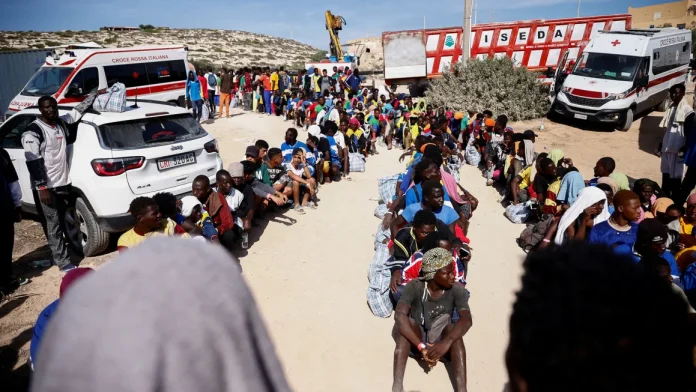Migrants rescued at sea while trying to reach Italy could be flown to Albania next month while their asylum claims are processed under a controversial deal under which the small Balkan country will take in thousands of asylum seekers on Italy’s behalf.
Speaking during a visit to Albania in June, Italian Prime Minister Giorgia Meloni said two centres designed to house migrants would be ready to receive the first 1,000 people by August 1. By that day, however, one of them was still undergoing intensive construction, casting doubt on whether it would be fully ready by the deadline. Neither Italy nor Albania has said when the first migrants might arrive.
The five-year agreement signed by Meloni and her Albanian counterpart Edi Rama last November provides for up to 3,000 migrants to be granted asylum, who are picked up by the Italian coastguard each month in international waters. They would first be screened aboard the ships that rescued them and then sent to Albania for further screening.
Only adult males will be held at the centres, Italian Ambassador to Albania Fabrizio Bucci told The Associated Press. People deemed vulnerable – women, children, the elderly, the sick or torture victims – will be housed in Italy. Families will also not be separated, the ambassador said. Those sent to Albania will retain the right under international and European Union law to seek asylum in Italy and have their applications processed there.
Since each application takes about a month to process, the number of people sent to Albania could reach 36,000 in a year. Italy has agreed to accept those who will be granted asylum. Those whose applications are rejected will face deportation directly from Albania, the ambassador said.
Barrage of criticism
Endorsed by European Commission President Ursula van der Leyen as an example of “out-of-the-box thinking” in tackling migration to the EU, the deal has been criticised by human rights groups as setting a dangerous precedent. The humanitarian organisation said in a July 23 statement:
The International Rescue Committee (IRC) highlights the risks associated with the scheme and urges the EU and its member states not to use this dangerous model as a blueprint for their own approaches to asylum and migration.
Earlier this year, the IRC called the deal “costly, cruel and counterproductive.”
Rwanda plan
This is not the first time a country has tried to outsource the accommodation of asylum seekers. Britain’s new Prime Minister Keir Starmer cancelled a criticised plan by the former Conservative government to send some migrants to Rwanda to have their asylum claims processed. New Home Secretary Yvette Cooper said the £700 million ($904 million) cost of the plan was “the most shocking waste of taxpayers’ money I have ever seen.”
The two centres in Albania will cost Italy 670 million euros ($730 million) over five years. The facilities will be fully managed by Italy and both centres are under Italian jurisdiction, while Albanian guards will provide external security.
Meloni’s attempt to solve the long-standing crisis with the help of Albania
One of the Meloni government’s most important election promises was to deal with migrants, refugees and illegal immigrants, mostly arriving on the Italian island of Lampedusa by sea from Africa and the Middle East. According to official data from the Italian Interior Ministry, more than 100 thousand migrants arrived in Italy during the current months of 2023, which is the highest number in the last 5 years. In this regard, since April 2023, the country has been under emergency regime, caused by the threat of a full-scale migration crisis in the Republic.
Italy, economically inferior to France and Germany, has taken and is taking the first blow: it is on the Sicilian shores of the Mediterranean Sea that hundreds and sometimes thousands of migrants land daily. Of course, not all of them see Italy as a place of permanent residence, but their priority and, as a rule, urgent accommodation falls on the shoulders of local authorities.
